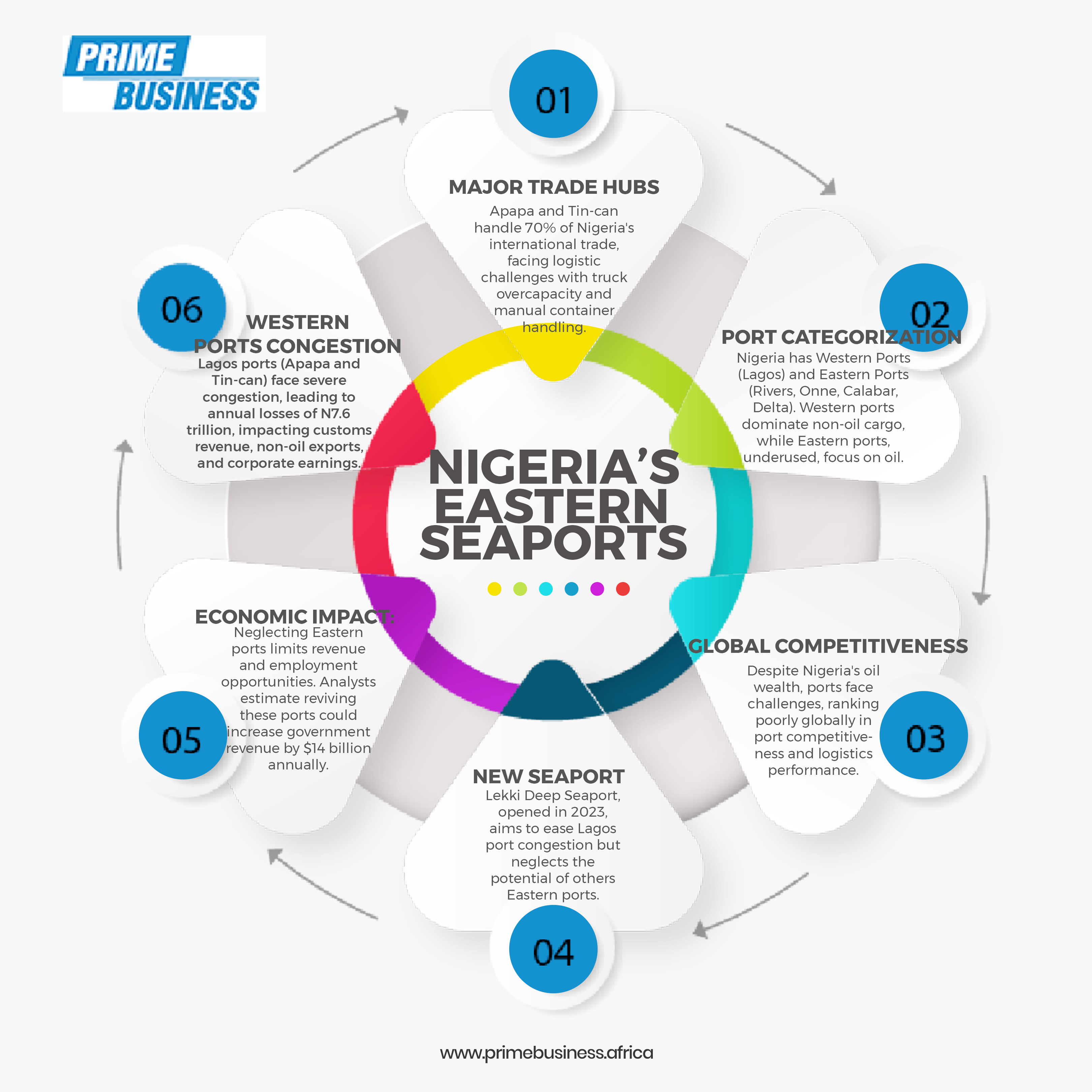Reviving Nigeria’s Eastern Seaports Will Increase Government’s Yearly Revenue By $14 Billion

In early April this year, the Lagos Chamber of Commerce and Industry (LCCI) reported that Nigeria loses N7.6 trillion annually to congestions in Apapa and Tin-can ports in Lagos. The report broke down the humongous losses as follows: N600 billion in customs revenue, $10 billion (N3.6trn) in the non-oil export sector, and N2.5 trillion in corporate earnings in different sectors.
Apapa and Tin-can Island ports handle about 70 percent of the country’s international trade, bringing them to face severe logistic and administrative problems. Against their daily capacity of 1500 trucks, the two ports handle a daily average of 5000 trucks. At least 1000 containers are cleared daily, yet only 400 of them can be accommodated by only two cameras available in the ports. The rest of the 600 are done manually, leading to a crunching loss of man hours. As a result, there is diversion of Nigeria-bound containers to Togo, Benin, DR Congo, and Ghana.
Nigeria has two main port categorizations, the Western Ports (Apapa and Tin-can Island) and the Eastern ports (Rivers Port, Onne Port, Calabar Port and Delta Ports), which tell the location more than anything. Apart from the skeletal use of the Eastern ports almost solely for oil cargoes, much of the import-export and general cargo business for consumer goods happens in the Western ports. By law, the Nigerian Ports Authority Act (NPA Act, 1999) gives the relevant minister the power to declare any place in Nigeria a port and specify the limits of such a place. It also allows the NPA to enter into an agreement for the provision and operation of port facilities in Nigeria.
Choking Port Congestions
In 2019, the NPA reported that the Nigerian ports handled over 85 percent of all the goods and services coming into the country when compared to those coming by road and by air. A total of 1,851 vessels came to Nigerian seaports with about 707,985 Twenty-foot Equivalent Units (TEUs) of containers and 33,895,784 metric tons of cargo throughputs in the first half of 2023. This was 16.6% less than the 849,175 TEUs of containers, which came into the country through 1,992 ships with an aggregate gross registered tonnage of 60.2 million tons within the same period in 2022.
Nigeria’s vast oil reserves and heavy-import dependence make it natural that the country will have very busy seaports. One advantage should have been a flourishing ports business. Unfortunately, by mid-2022, Nigeria still ranked 116 on the global port competitiveness index. Why not? The global standard average time to complete cargo clearance at the ports stands at 48 hours or two days. Nigeria boasts an average time of 336 hours (14 days), resulting also in an abysmal ranking of 110 on the World Bank’s Logistics Performance Index. The country seems not to be interested in the poor performance, because despite her vast sea potentials, the country has only seven seaports, four of them grossly underused. The seventh, Lekki Deep Seaport, opened in January 2023, leaving virtually the Apapa and Tin-can seaports to handle all of the export-import cargo.
Floundering Seaports in the Southeast
When the Lekki Deep Seaport opened for business, many analysts alluded to its importance ranging from the decongestion of the two other seaports in Lagos and the generation of employment and revenue. As a result, Nigeria needs to resolve the riddle about its obstinacy towards the benefits of reviving the other seaports in the country. It is becoming increasingly embarrassing that the unconfirmed reason for the abandonment of at least four other seaports in the eastern part of Nigeria is due to fears about the economic empowerment of that part of the country.
The continued neglect of the ports is beginning to confirm the age-long gossip, especially because government has poured billions of dollars into the development of six dry ports in the northern part of the country when there are no seaports to service them. Experts say that apart from helping to decongest the Lagos ports and raise employment, reviving other seaports will increase government revenue by $14 billion annually.
READ ALSO: Decongesting Nigerian Ports: What NPA, Customs Need To Move 7,500 Overtime Containers, Cargoes
The Abia State government has tried without success and federal support to develop a seaport at Obeaku, Ukwa East Local Givernment Area. It recently began a process to allow a private investor to develop the port, which lies 22 nautical miles to the Atlantic Ocean, making it one of the deepest shorelines in Nigeria. The Onitsha seaport has also been toyed with, despite the federal government’s attempt to utilize the seaport in 2021.
The wrong-headedness of the country towards the benefits of decongesting the Lagos ports is no longer a surprise given Nigeria’s behaviour with its refineries, agriculture and internal security – where successive governments appear to be a culprit in the woes recorded in these areas. For instance, it beats reason that a federal government uses its own military to resist the efforts of subnational governments to ban open animal grazing that has destroyed more than two million hectares of farms in the last 10 years, leading to food inflation of 30.64% by October of 2023. An investment banker, Mr Robert Anande, laughed off a country where one port has been congested for over 50 years, yet it would take just dredging the River Benue, for instance, to extend port activities to Makurdi, in addition to other areas in the east, which can reduce cargo clearing time to 48 hours.
The Usual Flimsy Excuses For Abandoning Nigeria’s Eastern Seaports
The reasons cited for delay in refurbishing the eastern ports include piracy, cost, the difficulty in dredging the long coastal lines and banditry. Speaking in 2022, the then Nigerian Port Authority’s Managing Director, Mr. Mohammed Bello-Koko, hinted at the government’s interest in decongesting the Lagos ports. He also said: “The Calabar port has the longest channel, with over 108 kilometers from the fairway buoy to the port; Rivers port is over 69 kilometers, so the cost of dredging those channels is expensive, but we are dredging them. Some of the ports are very old. Rivers Port is over one hundred years old, and the engineering designs used in constructing some of them are obsolete. The Warri Port breakwaters have problems, and the siltation is high, and it also has security problems because of the length of the channel.”
It is said that climate change has deeply depleted River Nigeria, and dredging could take several meters. Some analysts say therefore that it is hard to make the Atlantic Ocean to flow back into River Niger so as revive the Onitsha and Delta ports for ocean-going ships from around the world. Such analysts wonder if the country could afford the huge amount of money required to dredge the river. The analysts encourage the use of roads and air transport by the southeast instead of being fixated on seaports.
But such an analysis is bizarre in a country that that spent $6.1 million (without senate approval) on a presidential yacht; $150,000 million dollars for each of the 460 members of the National Assembly; a country which takes 1,411 delegates to the 2023 climate change conference in Qatar, yet Nigeria is not a major world greenhouse gas emitter; a country that spent $149.4 billion on an elusive oil prospecting in the chad basin. The above reasons further pale into insignificance when one considers that the Eastern ports can generate up to $10 billion in daily revenue for government. The country has an expansive network of trained maritime officials to ward off crime, barring corruption in their ranks.
Talking about using trucks to freight cargos, which part of the southeast has a good federal road? While on an inspection tour of the rehabilitation of Amanwozuzu-Uzoagba-Eziama-OrieAmakhia Road in Ikeduru LGA, Imo, September 9 2023, David Umahi, minster of works, revealed that it would take the federal government over N7 trillion naira to fix the federal roads in the southeast. This amount is a third of Nigeria’s 21.83 trillion naira budget for 2023. The airports have an even worse fate. While he was governor of Ebonyi State and Chairman of Southeast Governor’s Forum, Umahi was among the southeast leaders who went to plead with former President Buhari in 2019 to release funds for the rehabilitation of the then closed Akanu Ibiam Enugu International Airport.
The NPA is currently planning an upgrade of Nigeria’s port for the first quarter of 2024, and the upgrade is to begin in Lagos. The upgrade is billed to cost $1.1 billion. The NPA should do well to remember other ports. Nigeria may have started well by allowing China’s Habour Engineering Company and Singapore’s Tolaran Group to own a 75% stake in the $1 billion Lekki Deep Seaport. This foreign partnership is a global practice that works. The concessioning of port terminals being practiced by the NPA is also a global practice in which there are public-private partnerships in managing seaports. The refurbishment of the eastern seaports can take on this line of action. The NPA recently acknowledge that the Tin-Can, Onne, Warri, Calabar ports were on the verge of collapse. In reality, they may have fully collapsed. Thankfully, the NPA knows what to do. The idea of relegating the Eastern seaports endlessly is a clear foolhardy attempt to cut the nose to spite the face.
Dr Mbamalu, a Jefferson Fellow, is the publisher/Editor-in-Chief of Prime Business Africa
Follow on X: @marcelmbamalu















Follow Us